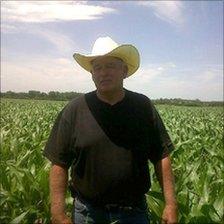Oil pipeline prompts fears for Nebraska farms' water
- Published
A proposed pipeline to pump oil from Canada to Texas would cut across America's agricultural heartland. Some farmers fear it could threaten the water supply to an entire region, the BBC's Ben Bevington reports from Nebraska.

Randy Thompson's family has farmed Nebraska land for 35 years
"If oil gets into the water we're done," said Nebraska farmer Randy Thompson, as he stood in one of his corn fields.
"You can't drink oily water and you can't irrigate crops with it."
A Canadian company, TransCanada, is seeking US government permission to build a pipeline that would carry more than half a million barrels of oil per day across Nebraska and over the Ogallala aquifer, which provides drinking water to two million people in the region.
Once completed, the 1,600-mile Keystone XL pipeline would stretch from the tar sands of Alberta in Canada across five Great Plains states to refineries on the Gulf coast in Texas.
It would cross Mr Thompson's land, and he worries that it would threaten the water he uses in his pastures and farmland here in the Great Plains.
In addition, critics say tar sands oil production destroys forests, generates huge emissions and leaves behind toxic pools of waste.
The project has some members of the US Congress and environmental activists questioning whether the US should allow a pipeline that would increase use of tar sands oil.
"We're adding to the carbon pollution for the globe, and we're making a multi-billion-dollar investment to expand our reliance on the dirtiest source of transportation fuel currently available," Democratic California Congressman Henry Waxman, chairman of the House committee on energy and commerce, wrote in a letter opposing the pipeline.
"I think that's a step in the wrong direction."
However, oil companies say state-of-the-art refinement techniques minimise emissions.
Nebraska 'heartbeat'
"We respect Representative Waxman's views but disagree with his assertions," TransCanada spokesman Terry Cunha told the Canadian Press.
"Expanding the regulatory review process to include a lifecycle analysis of greenhouse gas emissions, as Representative Waxman suggests, would unnecessarily delay the project and jeopardize the many critically important benefits it will bring to the United States."
In Nebraska, the proposed pipeline would be buried 4ft (1.2m) underground.
Mr Thompson says that would mean it sits in groundwater most of the year because the water table is so high.
"The heartbeat of our state is water supply," he said. "I'm concerned it could get contaminated."
Mr Thompson's family has farmed this stretch of land on the River Platte for 35 years. He says he is not seeking a showdown with the oil industry, and wonders why the pipeline cannot simply be re-routed.
"I just don't understand why we'd put our aquifer at risk," he said.
"Of course they'll try to make it safe. But recent events in the Gulf of Mexico with BP prove nothing is 100% fail-proof. Anything man-made will eventually fail."
'Wake-up call'
TransCanada says it will be able to detect leaks and quickly shut down any faltering section of pipeline.
The firm is confident that the state department, which has jurisdiction over the cross-border pipeline, will approve the project in the coming months.
The first section of the Keystone project was approved by the Bush administration and now pumps oil from Alberta to a refinery at Wood River in southern Illinois.
Yet the BP spill has complicated the Obama administration's decision on whether to approve the rest of the pipeline - the Keystone XL extension - running from Alberta to Texas.
The oil coming down the pipe is not pumped out of the ground but extracted from tar sands mined in Alberta, and questions remain whether relying on tar sands oil will help the US achieve the clean energy future President Barack Obama envisions.
"The disaster of the Gulf spill has really been a wake-up call for the nation," said Susan Casey-Lefkowitz of the Natural Resources Defence Council in Washington, DC.
"It's not just about finding some new source of oil that would somehow be safer, it's about getting off oil altogether.
"And so to build new infrastructure of pipelines and refineries to expand this very dirty tar sands oil from Canada is a huge mistake."
There is still huge demand for oil in the US, and the tar sands oil is used mostly for transportation fuel that cannot easily be replaced by renewable energy sources.
Supporters of the pipeline project say the US needs to find a reliable supply from a stable and friendly country.
Whether the Keystone XL pipeline goes ahead or not, Canadian tar sands oil is expected to become the top source of imported crude oil, external to the US by the end of this year.